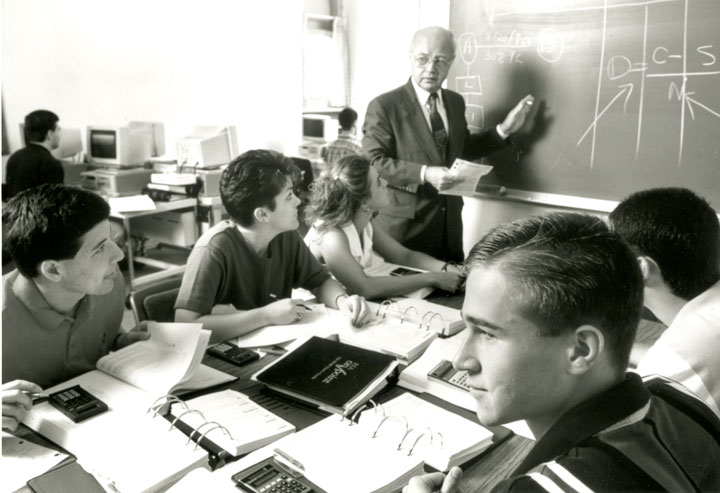Kelley Brenneman ’14 pens ‘History of Business and Accounting’ at MU
One of Kelley Brenneman’s fondest childhood memories is of her grandpa reading Richard Scarry’s “What Do People Do All Day?” to her.
When your grandpa is Art Gilbert ’53 and the book is about busy people and their careers, it’s likely to become a story you’ll hear over and over.

Accounting Professor Art Gilbert ’53 in the classroom
Now Brenneman, a 2014 Manchester graduate, has written a book of her own, inspired by her grandfather and decades of MU faculty and administrators who believed in preparing students for meaningful careers. Her only regret is that Gilbert, who died in June 2019, never got to read “The History of Business and Accounting at Manchester University.”
“I really enjoy doing research and writing, says Brenneman, who majored in history at MU. “It’s a lot of fun to preserve history because you never quite know where it will take you and what somebody might do with it.”
While Brenneman’s book will be of special interest to business and accounting graduates, it has broad appeal for anyone who cares about Manchester history. The author weaves in stories about external influences such as World Wars I and II, the Spanish Influenza (it killed 10 Manchester students), racial tension and the 1968 visit by Martin Luther King Jr.

Manchester’s commerce class in 1906
Her 187-page hardcover book, including historic illustrations, begins in 1892 when Professor W.R. Oyler started the Commercial Department for bookkeeping, typing and other secretarial skills. From there, Brenneman chronicles the evolution of business and accounting at Manchester, including the impact of her grandfather, who was on the faculty from 1958 to 1998.
Over 40 years, Gilbert led the growth of accounting at MU and elevated its stature to one of the most-respected accounting programs in the Midwest. He had high expectations and some of his students thought he was too demanding, says Brenneman. “But then they got into an accounting firm and realized just how well he had prepared them.” At that point, she adds, “it all made sense.”
Though she is understandably proud of her grandfather’s legacy – the Arthur L. Gilbert College of Business bears his name – Brenneman is quick to point out that he was one of many outstanding professors through the years.
“There was a program there long before my grandfather came, and the foundations that were there in order for him to build the program are just as important as his contributions were.”
Brenneman interviewed Gilbert extensively, while MU Archivist Jeanine Wine ’76 interviewed Professor Emeritus Richard Harshbarger ’56, who taught at Manchester from 1960 to 1999.
Harshbarger, along with Lola Sanger, the only faculty member who taught accounting from 1951 to 1958, worked with Gilbert to develop Manchester’s accounting major. Other faculty members such as Dorothy Johnson, associate professor emerita of business, also helped pave the way.
Shortly before his retirement, President A. Blair Helman split the accounting and business majors into separate departments, writes Brenneman. Gilbert headed the Accounting Department, while Harshbarger led the Business and Economics Department. Both professors mentored graduates who have gone on to distinguished careers in industry, public accounting, higher education, government, law and other fields.
Brenneman wrote much of the book at her dining table and researched it in the MU Archives, with Wine’s help. Much of that Manchester history is also part of her family’s story. Among the relatives she counts as graduates are her parents Jerry Brenneman ’81 and Cathy Gilbert ’83, three uncles, two aunts, her brother, and her husband, Brandon Curry ’14.
Brenneman, who earned her Master of Library Science at IUPUI, works at the Allen County Public Library in Fort Wayne. She would like to write another book if the opportunity arises, but for now she’s glad to have the dining room table back.
She also misses her grandpa and hopes he would approve of what she did all day when she was writing the book. “To my grandpa,” she wrote in the acknowledgement. “I know you wanted to live to see this book published, but I guess it wasn’t in the cards. I hope you’re proud of what I wrote. I love you.”
By
Melinda Lantz ’81